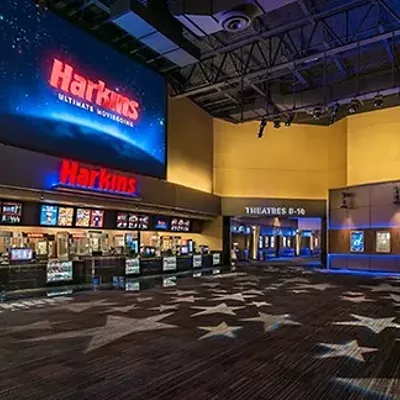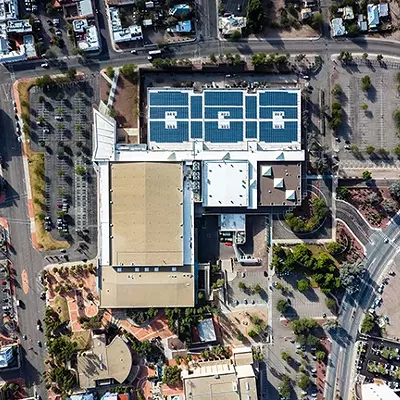Young lives with his family in two old trailers, stitched together like aluminum Siamese twins. Young, a truck driver, says the ruined fence is typical of life out here, and that calling the Pima County Sheriff's Department does little to help. "They say they can't come out to impose their will--or my will--on the four-wheelers, because this isn't a public street."
A half-mile away, Linda (who doesn't want to give her full name) is setting out dishes, blouses and wrinkled shoes for a yard sale. She bought her property three years ago for $20,000, she says. Then she plunked a mobile home on it.
Recently, she discovered this land she thought was hers had actually been subdivided again, and another trailer now sits just a few feet away. Does she plan legal action? Linda, whose English is poor, just shrugs. "What can you do?" she says.
Welcome to the Old Nogales Colonia. Sandwiched between Tucson and Sahuarita, near the Raytheon missile plant, this unincorporated sprawl of beater trailers, pre-fab homes, rutted roads and flood-prone trenches is like a Third World preview, some 60 miles north of the border.
Sewer and water systems here are mostly nonexistent. Many of the approximately 3,500 residents live on floodplains, or near eroded washes. Streets cut slapdash across ill-defined property lines; shady land deals are rife, and poverty is the common vernacular.
Even getting law enforcement amid the tangled web of dirt roads is a nightmare. Although deputies are equipped with maps, "It can delay response times," says Lt. Mike Sacco, a sheriff's department spokesman. That fact isn't lost on yahoos who consider this desert an off-roader's Shangri-La--the people who often harass residents like Harry Young. "By the time we get there," says Sacco, "they've often already gotten away."
Pima County has declared Old Nogales a colonia. The designation is restricted to communities within 150 miles of the U.S.-Mexico border that suffer severe infrastructure gaps, and it makes them eligible for federal development funds. Some 80 such colonias stretch across Arizona. And like Old Nogales, most are pockets of poverty where predatory lending practices and murky deed transfers are common.
"A lot of people don't have legal deeds to property they think they own," says Richard Rhey, executive director of the Southwest Fair Housing Council. "In some cases, they may move a mobile onto the property they think is theirs, or they may buy a mobile home they think is theirs. Then they'll negotiate a contract with the owner. But a lot of times, the deed isn't registered."
That sets the stage for disaster. "The land owner comes after four or five years and evicts the residents--after they've laid down money, made payments, made improvements. There will be some pretense, and the property owner will flip it and do it all over again."
Many blame this chaos on state lawmakers, who have perennially failed to rein in wildcat subdivisions. In these areas beyond city limits, property owners can split their land as many as five times without being compelled to install services such as roads, water and sewer.
"We have begged and pleaded (with the Legislature) to change the law," says Pima County Supervisor Ramón Valadez. But he's increasingly optimistic, since colonias are growing more common near the political power hub of Phoenix. "The problem isn't just limited to more rural counties these days, but it's now in Maricopa County as well."
While the issue has also been stalled by property-rights debates, Jennifer Burns also sees that logjam starting to break. A Republican representing District 25--including part of Old Nogales--in the state Legislature, she admits that balancing property rights and residents' rights can be tricky. "There is a valid argument that if somebody has property, they should be able to do what they want with it. On the other hand, you do have the need for emergency access, or to make sure people don't get flooded out--those sorts of things."
Arizona's population explosion--and strained water resources--has further helped focus minds, she says. "No bills have moved (in the Legislature) this year, but there has been a lot of pressure." Clarifying water rights and supplies "is one of the driving forces on this whole thing. Groups that traditionally have opposed any restrictions or any changes (to property rights) are now part of it."
In the meantime, addressing the rights of those who thought they were buying land in good faith remains a struggle. Given the relative affordability of colonia property--mobile homes or manufactured homes sell for as little as $4,000--the community attracts low-income residents, including many Hispanic immigrants. These residents are often ill-equipped to fight back when victimized by shady deals, even when offered assistance by groups such as the Fair Housing Council. "The frustration we have," says Rhey, "is that a lot of people contacted us for a lot of different problems, but weren't ready to file a complaint."
Still, Old Nogales residents aren't alone in feeling the bite. When problems arise with wildcat subdivisions, taxpayers often foot hefty tabs for improvements. For example, even small paving projects can easily cost more than $1 million. And after severe flooding in the colonia last year, the Pima County Flood Control District earmarked $480,000 for drainage improvements near the scene of a roadway collapse.
Federal funds also find their way to the colonia in the form of Community Development Block Grants. Since its colonia designation, Old Nogales and the surrounding area has received $48,000 for fire hydrants, $5,000 for a community garden and nearly $500,000 for road improvements.
That's a start. But for residents like Harry Young, there's still a long way to go. "Oh sure, we did get some money to build a park," he says. "But there's no money to patrol it, so now it's covered with graffiti."
His daughter comes to the front step, as he looks angrily up the dirt road. "Out here," he says, "we feel like we've really been forgotten."










